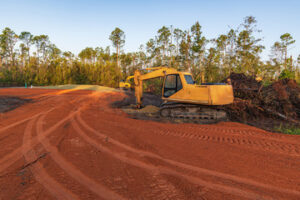Land Clearing Hays County TX involves removing trees, shrubs, underbrush and other vegetation from land. It is an important step before construction of structures like houses, roads and farms, and it improves the appearance of land.

It also helps preserve biodiversity by preventing diseases and pests from spreading. Pests such as termites thrive in rotting wood, and diseases spread through overgrowth of specific plants.
Whether it’s for construction, agriculture, or simply to improve the aesthetic of your property, clearing overgrown vegetation is an important preparatory step. It removes bushes, trees, stumps, and brush to create a clean slate that is ready for development or landscaping. It also helps prevent wildfires by reducing the amount of combustible material present on a piece of land. Choosing professional services for the job will help ensure that it is done correctly and safely, while complying with all applicable environmental regulations.
Clearing can be done by hand or with the use of heavy equipment, depending on the size of the area and type of vegetation to be removed. The best time to clear vegetation is in the fall or early spring, before new growth begins. This will help to avoid potential pitfalls like poison oak and poison ivy.
Some services offer the option to clear overgrown areas using herbicides, which inhibit regrowth and kill unwanted plants. This is a safe and effective method that can be used for large areas, but it’s important to choose a company with experience using this method. If done improperly, herbicides can be harmful to the environment and cause damage to surrounding species.
Overgrown brush and underbrush can become an obstacle to navigating your property, making it difficult to get around or maintain your yard. Removing dense vegetation can make your property more functional by creating clear pathways for vehicles, equipment, and people to move around without getting stuck or becoming lost in the woods. It can even help increase your property value by adding curb appeal and enhancing the overall aesthetics of the space.
Preventing Soil Erosion
Soil erosion is a natural process, but it can be accelerated by human activities. For instance, when farmers till (plow) the land before and after growing crops, they remove ground-covering plants that help stabilize soils. This exposes dirt to the force of wind, rain, and other natural elements that can erode and damage structures and buildings. Land clearing helps prevent soil erosion by promoting the growth of grass, shrubs, and other vegetation that are better suited to the area’s climatic conditions.
In addition, clearing out dead vegetation and rotting tree stumps can protect the land from wildfire risks and prevent airborne viruses that can infect plants and animals. Clearing can also prevent floods by stabilizing soil and regulating run-off.
Selective clearing involves removing specific trees and vegetation while leaving others intact, which can be more sustainable than full removal. This allows for the preservation of biodiversity and habitats while providing food sources for wildlife, such as moose and deer.
Once the vegetation has been cleared, the ground is graded to create a level surface suitable for construction or agriculture. Professional land clearing services often use specialized machinery to complete this step quickly and efficiently, saving time and money. The debris from the clearing process is disposed of properly, which can involve chipping wood or burning it in controlled environments. The ground is then prepared with nutrient-rich mulch or soil, which helps increase the health and fertility of the land for its intended purpose. Erosion control measures may also be implemented, including silt fences and cover crop plantings to mitigate water run-off and sediment pollution in nearby rivers and streams. Ultimately, these steps prepare the land for future development and ensure that future structures are safer from potential flooding and soil erosion.
Preventing Wildfires
Land clearing can reduce the risk of wildfires by removing fuel and creating firebreaks. This process makes it easier for firefighters to access the area and combat the flames. Land Clearing can also be used to create a defensible space around your home, reducing the chance of a wildfire getting close and damaging your property.
Dead trees and brush aren’t just a fire hazard, they can also pose safety hazards for passersby during strong winds and storms. In addition, rotting vegetation can harbor airborne viruses that can make people sick. Land clearing can eliminate these hazards by removing the overgrowth of bushes and trees.
Byers’ land clearing services in Nevada, Yuba, and Sierra Counties make your home and property more usable and enjoyable by removing overgrown trees, bushes, and ladder fuels to create a “defensible space.” Regular clearing also helps reduce the potential for future fires by maintaining proper horizontal spacing between plants and trees.
A land clearing project begins with a site inspection to determine the type and density of vegetation that needs to be removed. Then, a plan is developed detailing the methods and equipment required to complete the job. Land clearing can involve manual labor, heavy machinery (like bulldozers and backhoes), and even herbicides to kill off unwanted growth.
Clearing is often subject to environmental and zoning regulations. Your contractor should be familiar with these laws and able to ensure that all necessary permits are in place before work begins. It is also important that proper safety gear is worn at all times to protect workers from injury and accidents. Depending on the location, you may need a land disturbance permit and possibly additional environmental permits.
Preventing Diseases and Pests
Land clearing is essential to prevent diseases and pests that can be carried by overgrown plants. Pests like to breed in rotting wood and decaying plant material, so clearing away the debris helps reduce these risks. The process also eliminates places for mosquitoes to breed, which helps lower the risk of diseases such as West Nile Virus and Zika.
Clearing land can also prevent the spread of certain invasive plants that compete with crops for nutrients and sunlight. It can also help restore habitats for native wildlife species by removing invasive plants and creating open spaces. This helps promote healthy ecosystems and sustainable agriculture.
Overgrown trees and plants can block out sunlight and cause weeds to grow, which degrades soil health. By clearing these weeds, you can allow the soil to absorb more nutrients, which can help your plants thrive.
When an area is filled with overgrown vegetation, wildfires are more likely to occur. Clearing land removes the extra fuel for fires and protects structures on nearby plots from damage.
Aside from improving the appearance of your property, land clearing enhances its value. This is because a clean and well-kept property will attract potential buyers, especially if it’s near a public space or a recreational facility. Moreover, cleared land can be used for activities such as hiking and camping, which is beneficial to local communities and the environment. These activities encourage people to get outside and be active, which can improve mental health and overall well-being. They also create places for families and friends to gather and relax, which can strengthen relationships. Additionally, parks and trails require cleared land to provide safe and accessible pathways.
Increasing Property Value
A property’s landscape plays a critical role in influencing its market value. When a land is overgrown with trees, bushes, and debris, it can reduce the overall appeal of a home or commercial building. A well-cleared land, on the other hand, offers a wide range of practical benefits that can significantly increase its market value.
One of the most obvious reasons why Land Clearing can add to a property’s value is because it creates more usable space. A property that is filled with overgrown plants can be difficult to navigate, especially if it’s located in a remote location. Clearing the area makes it easier for people to walk around and access different parts of the property. This can be especially appealing to potential buyers who are looking for a home or investment property that they can easily maintain.
In addition to improving accessibility, clearing the land can also make it easier to install essential infrastructure like plumbing and electricity lines. This can be a major selling point for future buyers and investors as it will help them envision the future possibilities of their new property.
While the process of clearing the land might sound counterintuitive at first, it’s important to remember that this practice is not meant to be detrimental to the environment. The latest trends in Land Clearing focus on sustainable development and eco-conscious practices. For example, using GPS-guided equipment allows for selective clearing to preserve trees and minimize soil disturbance. This approach is not only more environmentally friendly, but it also shows that the property owner cares about the environment and will be more likely to sell or rent out the property to eco-conscious individuals.


